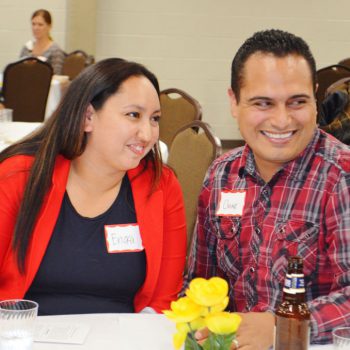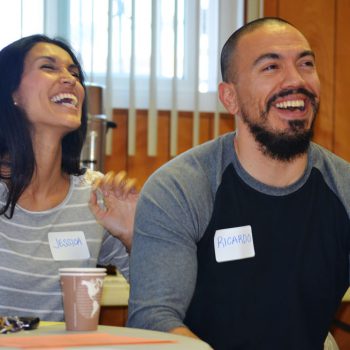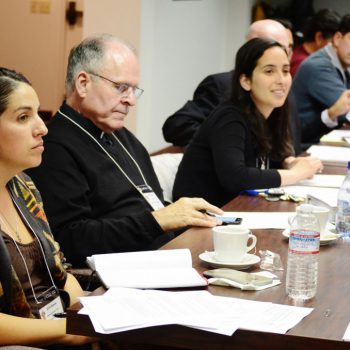The deep joy surprised Luz Galvez
She and her husband had stood up at the end of Mass, looked into each other’s eyes and repeated their wedding vows.
“In all the years we had been coming to this parish, we had never felt this way,” she said. “It was something very beautiful.”
The monthly “Renewal of Marriage Vows” segment Our Lady of Mount Carmel launched on Feb. 5 at all Sunday Masses is just one of the changes beginning to sprout around the San Diego Diocese. They are rooted in the proposals that delegates made at the end of a historic synod held last fall to help make parishes more welcoming and nurturing homes for families today. These can include young singles, long-time couples, like the Galvez, military families, and those who are separated or divorced.
The church in San Ysidro is one of ten pilot parishes across the diocese that have formed a Committee for Family Life and Spirituality to bring those proposals to life. Some are in the process of organizing their efforts while others have begun to hold events. Each parish is tailoring its plan to its demographics, building on existing ministries and programs when it makes sense and creating new ones when needed.
Fr. John Hurley, the synod’s coordinator, said the process to implement the recommendations has created more than 100 new parish leaders. In addition, two task forces continue to work to create mentoring programs for young adults and couples and to identify the best marriage preparation practices.
Two members of the task force to attract young Catholics, Ricardo and Jessica Salgado, are leading those efforts in El Centro.
They organized a “Date Night” for couples at St. Mary’s parish center on March 17, complete with a wine-and-beer happy hour, pasta dinner and a movie, plus child care on site. Ricardo Salgado said that between 80 to 100 people turned out, about 30 percent young people.
Many doubted the event was free.
“Some even thought it was a trick,” he said. “Come in for a party but then you have to pray the rosary.”
The main goal was to get people to meet each other outside of church and begin to build a Catholic community from there, he said.
Santa Sophia parish, meanwhile, is planning its own “Date Night” on April 8 and begins a 12-week workshop for divorced Catholics on May 8, part of an expansive agenda to implement the synod’s proposals.
Under the guidance of Father Devdas Masillamony, the parish organized five ministries to serve youth, young adults, married couples, the separated and divorced, and widowers.
The parish began offering a special event to be held every other month to welcome newly married couples the fold. The couples receive a special blessing from Fr. Devdas, accompanied by their families, and after Mass everyone is invited to a reception in the parish hall.
“This creates a culture in our parish where people come to see marriage as something worth celebrating,” said Heidi Chokeir, who is spearheading all of these efforts. “Young people and teens see people getting married as something cool not this weird thing.”
The new couples likely don’t many parishioners, Fr. Devdas said.
“This gives us our community an opportunity to pray for them and to support them,” he said, “and to let them know that we have programs to take care of them.”
At Our Lady of Mount Carmel, the couple leading the implementation of the proposals acknowledged that changing parishioners’ attitudes will take time.
“It’s not something that’s going to happen overnight,” said Elvia González.
But they see progress.
They organized a special event after the 7 a.m. Mass on Feb. 12 to mark World Marriage Day, one of the ideas mentioned in a synod proposal. In addition to receiving a special blessing, all couples were invited to write on a board their names, wedding date and how long they had been married. Some had been married only a few months, others much longer.
“We had two couples who have been married 63 years,” said David González.
He said the joy during the event was palpable.
“People came up to us afterward and asked, ‘How can we start the process to get married here?’”
The San Diego Diocese moved quickly in the New Year to implement the synod’s proposals to strengthen Catholic marriage and families.
- Two task forces met to begin their work on engaging young adults and couples in parish life and on establishing the best practices for marriage preparation.
- The diocese began accepting applications for the director of the newly configured Office of Family Life and Spirituality.
- Ten churches across the diocese volunteered to become “pilot parishes,” where some of the proposals can begin to be tested. This is important because the main work of strengthening families and marriages has always been envisioned as occurring at the parish level, led mainly by parishioners, and not necessarily at the diocese.
Some 120 delegates, mostly parishioners, participated in an extraordinary synod on marriage and family the diocese organized in the latter half of 2016. At its conclusion, the delegates presented Bishop Robert McElroy with 15 proposals to welcome unmarried couples to the Church, to offer pastoral support for the divorced, to witness the beauty of realism of marriage, to nurture children, and to bring spiritual depth to family life.
A 25-member committee is meeting monthly to advise the implementation of the proposals, which also are being reviewed by the Priestly Council.
The task forces had an introductory meeting on Jan. 8 at St. John the Evangelist parish in San Diego.
“We need your ideas to make the proposals a reality. Otherwise, they are just works of fiction,” said Fr. John Hurley, CSP, at the start of the first task force meeting.
That group is to recommend strategies a parish can use to welcome and accompany young adults and couples into the full participation of church life. Fr. Hurley stressed that no single strategy would work at every parish, but rather should be tailored to each location’s demographics.
The participants were young couples or parishioners who had worked in young adult ministry. They shared what initially drew them to their parish and had kept them engaged in it. For their next meeting, Fr. Hurley asked them to consider ways they would engage young adults and couples into parish life, consulting with fellow parishioners, and report back. He told the group that he hoped they concluded their work by mid-year.
The second task force will focus on the subject of marriage preparation. The group mainly will evaluate the marriage prep programs that are available, including on-line and those offered by other denominations, and recommend what the diocese should use in the future.
The task force members decided to conduct an online survey to find out what each parish does to prepare couples to marry. And they divided other fact-finding tasks among the members. Fr. Hurley told them that he hoped they could complete their work by summer.
Meanwhile, the diocese’s Human Resources department began accepting applications for director of a new Office for Family Life and Spirituality. Synod delegates proposed the creation of this office, which will serve the distinct needs of engaged couples and the newly married and those going through separation or who are divorced as well as promote family spirituality.
At the synod, many delegates said they needed more information about conscience formation and the Internal Forum, two fundamental concepts of Catholic teaching that Pope Francis referred to in his apostolic exhortation, “The Joy of Love.” Fr. Hurley told the members of both task forces that the Bishop had decided that information about these concepts would be shared first at the clergy level. Afterward, ways would be identified to move that information into the pews.
The San Diego Diocese will have new Office of Family Life and Spirituality next year that will not only provide ministering at critical moments in the life of Catholics but will pursue new ways to deepen their faith.
The office will be led by a director and staffed by three coordinators: One to minister to engaged and newly married couples, one to support separated and divorced individuals, and a third to promote family spirituality.
The creation of that office begins to bring to life many of the proposals submitted by 120 delegates to a historic synod held in the fall to develop ways to strengthen marriage and families in the diocese. Since it ended on Oct. 30, Bishop McElroy has been working with the diocese’s leadership to study how to implement the proposals.
On Nov. 30, he met with a committee tapped to guide that implementation. Together, they began to set the foundation to fundamentally change the culture in parishes to better serve the variety of families that cross their doors who are confronting a host of modern-day challenges.
The committee is made up of 20 parishioners and five priests who had served as synod delegates. They represent a variety of backgrounds, ethnicities and ages and many of the parishioners have significant experience as lay ministers.
The Bishop told the members that he had recently met with Pope Francis in Rome and had shared news about their synod, which had been inspired by the prelate’s own document “Amoris Laetitia,” or “Joy of Love.”
“He said he would pray for us and the work we were going to do,” the Bishop said. “So we have great blessings helping us.”
Then the Bishop laid out a plan to implement the first of the proposals and asked for feedback from the committee. Those proposals called for the reconfiguration of the existing Office for Marriage and Family Life and the creation of a new office to promote family spirituality.
The Bishop said this would be accomplished by creating a new Office of Family Life and Spirituality. This office would be headed by a bilingual director who would work with three coordinators. One would prepare engaged couples for marriage and support newly married ones. One would minister to individuals coping with the stages of separation and divorce. And a third would promote family spirituality in a variety of ways.
Fr. John Hurley, CSP, the synod’s coordinator, emphasized that the bulk of this office’s work would not be centralized at the diocese but rather done at the grassroots level in the local parishes.
One of the committee members, Father José Muro of Our Lady of Guadalupe in Chula Vista, expressed a concern that as the new office took shape with new personnel and new ways of doing things everyone needed to be on the same page.
“What are we teaching as the Catholic faith in the Diocese of San Diego to families, to the divorced, to young couples?,” Fr. Muro asked. “We need clarity, so we can all work together as a team.”
The Bishop said that all plans would be reviewed with the Priest Council and the deaneries, which would have an opportunity to shape them and develop continuity from one parish to another.
The diocese’s Human Resources director, Bobbie Espinosa, told the committee that job descriptions for the new office would be prepared in December and the positions would be advertised starting in January. The idea is to have the director on board by March, so he or she could participate in the selection of the three coordinators. The goal is to have the new office working by July.
The committee also formed two task forces to lay the groundwork for the new office to implement additional goals once it opens.
One task force will evaluate the available marriage preparation programs and recommend the best practices the diocese should follow, in consultation with priests and parish staff. The bishop said that between 1,300 to 1,400 couples marry every year in the diocese.
The other task force will develop a parish-based mentor program to welcome and accompany young adults and couples into the full participation of church life. The bishop said he was not aware of any such program, calling this group’s work “visionary.”
The committee members nominated individuals who could serve on those task forces, some volunteering to participate personally, as well.
They also nominated ten churches that would become “pilot parishes.” Each would form a team made up of five diverse couples who would promote the new vision for serving families, observing how initiatives fared once they were rolled out.
“We know some of the elements will fly high and some elements are going to crash,” the Bishop told the committee. “We need to identify what works.”
He said the teams were important because they would sustain the new vision without further burdening the pastor or staff.
The task forces and parish teams begin to move the synod’s priorities from the 120 delegates that formulated them to the churches themselves, where they need to be carried out, Fr. Hurley said.
The bishop underscored the ultimate goal in the effort to refocus the work of the diocese.
“The first and most important priority is making the parishes beacons of marriage and family life.”
Contacts
Associate Director, Separated and Divorced Ministry
Phone: (858) 490-8292
jperegoy
 sdcatholic.org
sdcatholic.org


